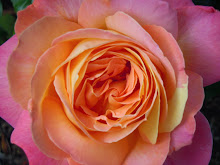It was during oat threshing that Barney died. It was during the time when I was acting as a bundle hauler all by myself — I suppose I could have been 16 years old or so. He had been acting strangely the evening before but he had been hitched up for work in the usual fashion. The threshing was being done that day at the Peterson farm, so the threshing run was close to its conclusion (Uncle Carl would normally thresh his own oats last). For some reason the threshing machine was oriented in a rather unusual way in the barnyard so that the bundle racks proceeded through a seldom-used gate near the southeast corner of the barn. The land sloped away from the barn at this location, not sharply by significantly. As I was driving the fully loaded rather top-heavy bundle rack through the gate, Barney paused, causing Birdie to stop also. I think it was because of the illness he was experiencing. Anyway, the pause and the slope of the ground was just enough to let the rack slowly top over. What this meant was that the superstructure and the load of the rack detached from the carriage and this is what tipped over. I, of course, followed the load over onto its side. That evening after being let out of the barn for the night, Barney ran ceaselessly from one end of the barnyard to the other end and when I went out to bring the horses into the barn for the day’s work he was nowhere to be found. During the night he had broken out of the yard, run down the road about half a mile west, broke into a cornfield and after breaking down a significant number of corn stalks, expired. The damage he did in the cornfield was sufficient so that Uncle Carl needed to recompense the farmer whose field it was. For the remainder of the threshing run, Uncle Carl arranged for another old nag, I think from our neighbor at the time Carl Anderson (father of Harlan). This aged horse, sort of mixed bay and white in color, was a poor substitute for Barney. As was also the horse Uncle Carl acquired to take his place permanently. This was old Bird, previously owned by Vic Telleen, our neighbor to the east. The final conclusion was that Barney had contracted sleeping sickness (encephalitis) which as a disease afflicting horses at that particular time. I was sorry to see Barney go — I felt he was a good worked and well more than half the motive power of the team. Birdie and Bird were a poor substitute. It was not too long after that year that the threshing run ceased to function and I have little recollection of driving Bird and Birdie (though I do remember the difficulty I always had in getting Bird to take the bit when I was bridling her).
Birdie lived on for some time. Then during some wintertime when she was out in the barnyard and the ground was icy or slippery she fell over and couldn’t get up. My recollection is that the place where she fell was just outside a double gate opening into the house yard. This was an area in the barnyard where the horses were not allowed normally and I can recall no reason for her being there. It was during the part of the winter when there was no farm work to be done and Uncle Carl was not coming out to the farm at all. I, or my mother, telephoned into him at Grandmother’s and he came out to review the situation. The decision was that she was too old and feeble to be rescued from her predicament, so she was dispatched. Whether the veterinarian administered the coup de grace, or whether it was the employee of the rendering works to which her remains were consigned that disposed of her I don’t recall. So ended my association with Barney and Birdie, and so also did the era of horse-drawn agriculture on the Peterson farm. What had happened to old Bird I have no recollection whatsoever.
Friday, September 11, 2009
Subscribe to:
Post Comments (Atom)





No comments:
Post a Comment